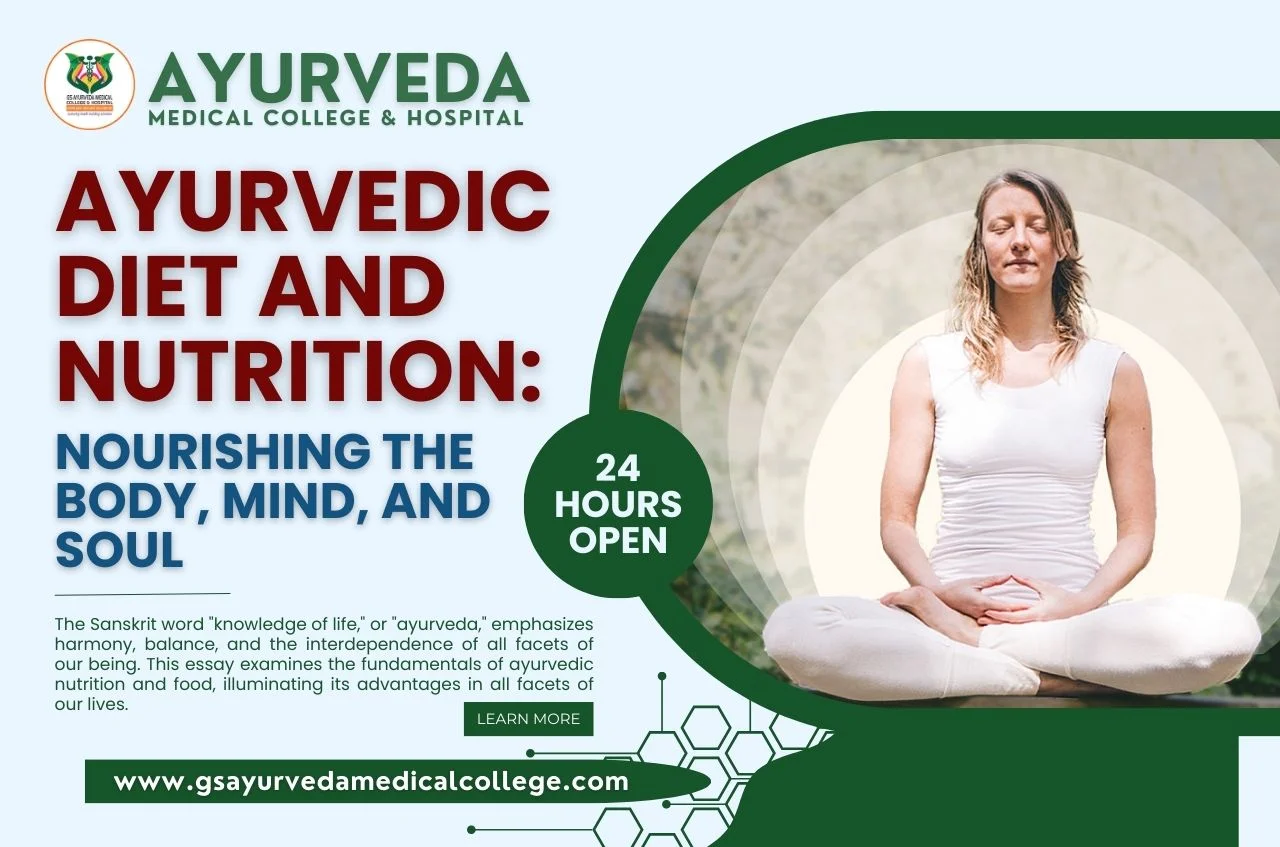
Ayurvedic Diet and Nutrition: Nourishing the Body, Mind, and Soul
From a young age, Ayurveda provides genuine ideas of eating that supports the body, mind, and soul in today's society of trendy diets. The goal of obtaining balance and harmony is the main focus at a Private Ayurvedic College in Uttar Pradesh. Ayurvedic teachings lead people to overall well-being.
The Sanskrit word "knowledge of life," or "ayurveda," emphasizes harmony, balance, and the interdependence of all facets of our being. This essay examines the fundamentals of ayurvedic nutrition and food, illuminating its advantages in all facets of our lives.
Ayurvedic Nutrition in Uttar Pradesh: Exploring Educational Opportunities
Private Ayurvedic Colleges in Uttar Pradesh
For those on a quest to unravel the profound wisdom of Ayurvedic principles, the heartland of Uttar Pradesh offers a haven of knowledge in the form of Private Ayurvedic Colleges. These esteemed institutions stand as pillars of holistic education, providing an immersive journey into the world of Ayurveda. With a curriculum that transcends textbooks, these colleges offer comprehensive courses that delve deeply into the realms of Ayurvedic medicine, including its intricate dietary aspects.
Students who embark on this educational odyssey are not only equipped with theoretical insights but also gain hands-on experience through practical sessions. They learn to decipher the language of herbs, understand the alchemy of food, and unravel the mysteries of the doshas. These colleges become more than classrooms; they become sanctuaries of experiential learning, nurturing the next generation of Ayurvedic practitioners who will carry forward this timeless knowledge. Discover Private BAMS College in UP with fee structure and explore for a rewarding journey into Ayurvedic education.
In the embrace of Private Ayurvedic Medical Colleges in UP, individuals find themselves immersed in an environment that honors tradition while embracing innovation. They become part of a community that is dedicated to preserving the essence of Ayurveda while propelling it into the modern era. The journey through these colleges is not just educational it's transformative, shaping not only careers but also perspectives and lives.
The Core of Ayurvedic Philosophy
The Three Doshas: Vata, Pitta, and Kapha
At the heart of Ayurvedic philosophy lie the three doshas: Vata, Pitta, and Kapha. These doshas, shaped by the elements of air, fire, water, earth, and ether, form distinct constitutions within individuals. Recognizing one's predominant dosha becomes pivotal in crafting a diet that fosters equilibrium and well-being. Understanding the interplay of these doshas unveils a personalized approach to nourishment, aligning the body and mind in pursuit of optimal health.
The Role of Agni
The Role of Agni in Ayurveda holds paramount significance. Often referred to as the "digestive fire," Agni governs the intricate process of digestion and metabolism within the body. This vital force not only breaks down food into its essential nutrients but also ensures their efficient absorption and assimilation. In Ayurvedic philosophy, Agni is regarded as a transformative energy that converts ingested substances into nourishment, providing sustenance to every cell and tissue.
A well-functioning Agni not only supports physical health but also maintains mental clarity and emotional equilibrium. When Agni is balanced, toxins are efficiently eliminated, preventing the accumulation of ama (undigested waste) in the body. Nevertheless, when Agni is out of balance, it can cause problems like digestion troubles, tiredness, and even emotional unease.
To achieve overall wellness, Ayurveda highlights the importance of taking care of Agni by eating mindfully, choosing appropriate foods, and following a lifestyle that aligns with the body's natural patterns. By tending to the "digestive fire," individuals pave the way for optimal health, vitality, and overall harmony.
The Ayurvedic Diet: A Holistic Approach
Eating According to Dosha
In the intricate tapestry of Ayurveda, the Ayurvedic diet stands as a vibrant thread woven to honor the uniqueness of each individual. This dietary philosophy recognizes that our bodies and constitutions are distinct, implying that our nutritional requirements vary accordingly. This profound understanding prompts Ayurveda to categorize foods based on their inherent qualities and their impact on the doshas the dynamic forces that shape our being.
For instance, when seeking to balance Vata dosha, which embodies the elements of air and ether, the Ayurvedic diet suggests incorporating warming foods. These choices help ground Vata's airy nature, providing stability and nourishment. On the other hand, for Pitta dosha, characterized by fire and water elements, the focus is on cooling foods that soothe and temper Pitta's fiery disposition.
The Six Tastes
At the heart of Ayurvedic eating knowledge lies the idea of the six tastes. These tastes - sweet, sour, salty, bitter, pungent, and astringent - have distinct qualities and contribute to our health. Ayurveda suggests having all six tastes in each meal for a balanced and enjoyable experience, catering to various nutritional requirements.
The sweet taste, found in nourishing foods like grains and fruits, offers comfort and nourishment. Sour foods, such as citrus fruits and fermented items, stimulate digestion and invigorate the senses. Salty foods, when consumed mindfully, provide necessary minerals and enhance the overall dining experience. Bitter foods, like leafy greens and herbs, support detoxification and aid digestion. Pungent flavors, found in spices, kindle the digestive fire and awaken the senses. Lastly, the astringent taste, present in foods like legumes and certain vegetables, contributes to balance and contraction.
By weaving these six tastes into our meals, we embark on a culinary journey that caters to our holistic well-being. Ayurvedic knowledge helps us respect our bodies, know our dosha balance, and welcome the array of tastes nature provides.
In simple terms, the Ayurvedic diet isn't just rules; it's an opportunity to create balance with our bodies, nature, and our core selves. Through mindful consumption, conscious choices, and an appreciation for the six tastes, we align with the rhythms of life and nurture ourselves on a profound level.
Nourishing the Mind and Soul
The Mind-Gut Connection
In the intricate landscape of Ayurveda, the profound connection between the mind and the gut is a cornerstone. Ayurvedic philosophy recognizes that a serene mind has a profound influence on digestion, and conversely, optimal digestion fosters mental clarity. This symbiotic relationship underscores the importance of cultivating a tranquil mental state for overall well-being.
Meditation and Mindful Eating Practices
Central to Ayurvedic living is mindfulness, in both meditation and eating. Meditation, a strong method for calming the mind, encourages relaxation and lessens stress, a main factor in digestive issues. Mindful eating, too, is pivotal. Engaging our senses during meals enhances the digestive process, allowing the body to extract maximum nourishment from the food we consume.
Food as Prana
Ayurveda's wisdom extends beyond the physical to embrace the spiritual and energetic dimensions. Food is not solely sustenance for the body; it's a vessel of prana, the life force that animates us. The quality of this life force is influenced by the choices we make. Opting for fresh, seasonal, and locally sourced foods infuses our meals with a higher pranic value. This elevates the nourishment we receive, touching not only the physical body but also the subtle energies that shape our existence.
By acknowledging food as prana, Ayurveda encourages a conscious approach to eating one that transcends the act of consumption and becomes a sacred ritual. Being conscious lets us link with the natural energy in our food, enabling us to use its strength for our overall health.
Moreover, Ayurveda illuminates the profound interplay between our mental, physical, and spiritual realms. Through meditation and mindful eating, we promote a peaceful mind and acknowledge the energy in food. This begins a transformative path of nourishing not just our bodies, but also our minds and spirits.
Ayurvedic Nutrition: Beyond the Plate
Daily Routines and Ritucharya
Ayurveda, a tapestry woven with holistic wisdom, extends its embrace beyond the mere act of eating. It gently whispers that life's symphony is composed not solely of the foods we choose, but also the rhythms we dance to. Within this philosophy lies the art of crafting daily routines that harmonize with our doshas and the ebb and flow of the seasons. These routines become a symphony of balance, nurturing our well-being.
Ritucharya, the dance of seasonal routines, embodies Ayurveda's profound connection with nature. As the seasons shift, so do our bodies needs. These ancient rhythms guide us to adjust our lifestyle, diet, and practices in alignment with the world around us. Just as leaves fall and blossom anew, our habits transform to synchronize with nature's symphony.
Mindful Eating Practices
At the heart of Ayurvedic nutrition, lies the quiet practice of mindful eating. It's a voyage beyond just eating, urging us to relish each bite with appreciation. Ayurveda guides us to eat in a calm, focused setting, without disruptions, enabling us to truly be present with our nourishment. This conscious involvement leads to a stronger link with the sustenance that supports us.
In the realm of Ayurveda, mindful eating is not a mere technique but a transformative experience. It nurtures our bodies and nurtures the relationship we share with food. By savoring each bite, we acknowledge the miracle that unfolds with every meal the fusion of nature's bounty with our being. This practice heightens our awareness, cultivates gratitude, and elevates our connection with both the plate and the world around us.
In Ayurvedic College in Uttar Pradesh, Ayurvedic nutrition extends an invitation to a symphony of living that surpasses the mere consumption of food. It beckons us to tune into the melodies of our daily routines, to sway in harmony with the changing seasons, and to embrace the sacred art of mindful eating. By intertwining these threads, we weave a tapestry of well-being that transcends the boundaries of the plate and nourishes the essence of our existence.
FAQs about Ayurvedic Diet and Nutrition
1. Can anyone follow an Ayurvedic diet?
Absolutely! Ayurvedic principles can be adapted to suit anyone's needs and constitution.
2. Are there specific foods I should avoid based on my dosha?
Yes, certain foods might aggravate your dominant dosha. Consulting an Ayurvedic practitioner can provide personalized guidance.
3. Is an Ayurvedic diet only about weight management?
No, an Ayurvedic diet focuses on holistic well-being, encompassing physical, mental, and spiritual aspects.
4. Can Ayurveda help with digestive issues?
Yes, Ayurveda offers insights into improving digestion and addressing various gut-related concerns.

